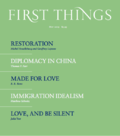Matthew Schmitz: Immigration Idealism: A Case for Christian Realism
 Matthew Schmitz, “Immigration Idealism: A Case for Christian Realism” First Things (May 2019).
Matthew Schmitz, “Immigration Idealism: A Case for Christian Realism” First Things (May 2019).
As usual, the writing of Matthew Schmitz, senior editor of First Things, is clear and cogent—and courageous. He fearlessly tackles daunting topics such as, in this case, immigration. It is a genuine pleasure to follow his almost seamless integration of personal testimony, social environment, rational investigation, and theological articulation. I particularly appreciate Schmitz’s compatible juxtaposition of Protestant ethical and social theologian Reinhold Niebuhr’s realism and Catholic natural theologian Thomas Aquinas’s political theory. Well done!
I will confess up front that I am in a position of a high level of agreement with what I take to be Schmitz’s primary assertions. Liberal idealism is an impractical and unworkable assumption about the world in which we live. It arises out of an over-realized eschatology rooted in an inaccurate assumption that utopia has already been achieved if people will just act like it. Further, liberal Christianity’s idealism has an anemic hamartiology. It simply does not realize the depth and extent of human sinfulness.
I am in something of a shock over the intensity of Schmitz’s insistence that outright contempt is behind liberal attitudes toward American citizens in general. Indeed, religious elitists do often ascribe ignorance and inferiority to their opponents (John 7:49). But I wondered if Schmitz overstated his case here. I fear not. I know liberal Christians of whom contempt for others would not be an accurate description. Yet I must admit in my own dealings with liberal Christianity I have often encountered an arrogance and animosity toward conservative Christians that is nothing short of contemptuous.
Liberal Christianity’s idealism simply does not realize the depth and extent of human sinfulness.
Nevertheless, although my journey and that of Matthew Schmitz have much in common, they have different starting points—and that affects their direction. Schmitz initially assumed the need for open borders and viewed with contempt those who thought otherwise. His life experiences and development eventually changed his direction toward a more closed border mindset. I had the opposite experience. I initially assumed the dire need for strictly enforced closed borders. My familial background is Pentecostal Christian. Pentecostals are very conservative, both religiously and politically. Furthermore, my first jobs included construction work, working in a truck stop, and factory labor. Immigrants were frequent rivals for scarce resources. My brother-in-law lost his job as a sheetrock hanger because he could not compete with the low wages undocumented immigrants were constrained to endure. Secure borders were a matter of economic survival for us … even before 9/11 and another whole set of security concerns.
Category: Living the Faith, Spring 2019


